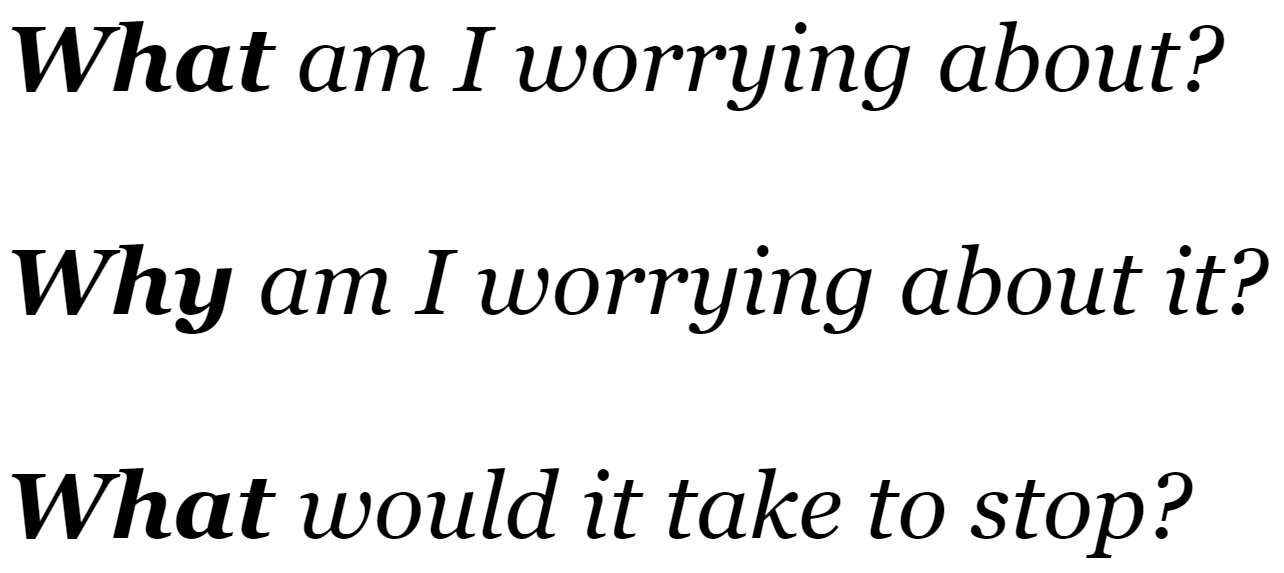The Three Questions You’ll Need to Reduce Anxiety
If you’ve been keeping up with my other posts or have read a sample of my book, you’ve learned some of the science behind anxious symptoms like nausea, rapidly beating heart, shortness of breath, and intrusive thoughts.
For those reading for the first time, I suggest checking out this post, but if you’re in a hurry, here’s a quick synopsis:
When we worry, it signals to the unconscious brain that it’s in danger, causing it to produce adrenaline.
The more we worry, the more adrenaline our body makes, and the longer our symptoms last.
If we’re having serious trouble with anxious symptoms, it’s not our unconscious brain that’s the cause, but rather the worrying we do.
The bright side to this is that once we stop worrying, our body stops producing so much adrenaline, leading the symptoms to slowly fall away on their own. So, if we’re looking to recover from an anxiety disorder or period of anxious discomfort, we have to reduce how much we’re worrying.
We can do this by asking ourselves these three questions:
Actionable Problems
Our answers to these questions can fall into one of two categories.
The first is when our problem can be solved by taking action. For example, if we haven’t studied for a test, we may be worrying that we’ll fail. Or we may feel some symptoms of illness, like a sore throat or a stomach ache, and start to worry that we might be getting sick. In these cases, the solution is simple: act. Begin studying or call the doctor, and answer any urges to worry with “I’m taking care of it, so there’s no need to keep worrying.”
Inactionable Problems
However, for most of us, this kind of worrying comprises only a very small amount of time. Far more time is spent worrying about failing even after we’ve studied or worrying that we’re sick even if we’ve gotten a clean bill of health. In these cases, the problem isn’t with our lack of studying or going to the doctor, as doing these things again won’t have a meaningful impact. We can keep studying the material we already know or going to the doctor even when we know all of our tests will come up negative, but these actions don’t logically move us closer to solving our problem. In addition, they create a bunch of painful adrenaline-related symptoms in the process.
In these cases, the problem is with our choice to keep worrying. We keep asking ourselves whether we’re prepared or whether we’re sick because we’ve become used to worrying in this way, but as you now know, there’s nothing we can do in the moment to help, and any further worrying we do negatively affects our body.
Thus, the solution here is not to take action, but rather to recognize when we’re worrying unproductively, and answer the urge to keep worrying rather than act on it. A basic answer we can give is something like “there’s nothing I can do to directly address my test or my health right now, but worrying has a negative effect on my body, so I need to focus my attention on something else.”
The Caveat
But this kind of answer may not always hit the spot. There are times when we know we’re not worrying productively and have difficulty stopping even with such an answer. Or times when we’re not sure whether we’re worrying in an actionable or inactionable way. That’s why I devoted a whole section in my book to strategies we can use to pick apart what we’re worrying about and find the best path forward. The book comes out January 5th, but is available for pre-order right now. Otherwise, you can check Facebook or Instagram for updates on more content like this.
For now, I wish you luck with your journey, and hope you have a speedy recovery.



